Feeding your Betta fish the right diet is crucial for its health and happiness. These beautiful, vibrant fish, known for their flowing fins and bright colors, need more than just a pretty tank to thrive.
One of the most popular treats for Betta fish owners to offer is bloodworms. But how often should you feed these wriggly snacks to your Betta? Let’s dive into the details.
Betta Fish Dietary Needs
Betta fish, also known as Siamese fighting fish, are carnivores by nature. In the wild, they feast on insects and larvae, which means their diet is rich in protein. Protein is vital for their growth, energy, and maintaining those gorgeous colors. While Betta fish pellets are a staple in many home aquariums, introducing variety into their diet can mimic their natural eating habits and keep them excited about feeding time.
What Are Bloodworms?
Bloodworms are not worms, per se, but the larvae of midge flies. They’re called bloodworms because of their bright red color, which comes from the high hemoglobin content in their bodies. There are three main types of bloodworms available for Betta fish: live, frozen, and freeze-dried.
Live Bloodworms:
These are the freshest options, but they can carry parasites if not sourced properly.
Frozen Bloodworms:
A safer choice, these are flash-frozen to kill off any potential nasties while retaining their nutritional value.
Freeze-Dried Bloodworms:
Convenient and long-lasting, though they might not be as enticing to your Betta compared to live or frozen.
Bloodworms are packed with protein and other nutrients that are beneficial for Betta fish, making them an excellent treat when given in moderation.
How Often Should You Feed Bloodworms?
Feeding your Betta fish bloodworms is a treat, not a daily staple. Think of bloodworms as the dessert of the Betta world—delicious, and nutritious, but best enjoyed in moderation. A good rule of thumb is to offer bloodworms 2-3 times a week, in addition to a balanced diet of pellets or flakes.
The frequency of feeding bloodworms can also depend on your Betta’s age, size, and health. Younger, growing Betta fish may benefit from slightly more frequent feedings, while adult fish should have bloodworms less often to prevent overfeeding.
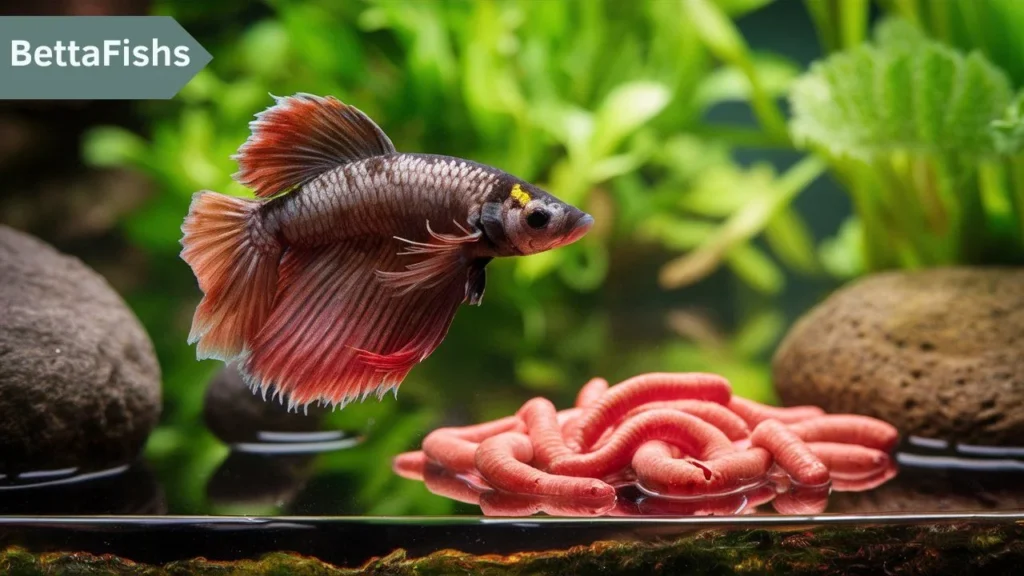
The Risks of Overfeeding Bloodworms
While bloodworms are healthy, overfeeding them can lead to several problems. Betta fish have small stomachs, roughly the size of their eye, so it’s easy to overdo it. Overfeeding bloodworms can cause constipation, bloating, and other digestive issues. In some cases, it might even lead to swim bladder disorder, which affects the fish’s ability to swim properly.
To avoid these issues, monitor how much you’re feeding and look out for signs of overfeeding. If your Betta seems lethargic, is floating awkwardly, or has a bloated belly, it might be time to cut back on the bloodworms.
Balancing Bloodworms with Other Foods
A varied diet is key to keeping your Betta healthy and happy. While bloodworms are a great source of protein, they should be balanced with other foods. High-quality Betta pellets should form the basis of your fish’s diet, providing all the necessary nutrients.
Consider feeding bloodworms on alternate days and using the other days for pellets, brine shrimp, or daphnia. This ensures your Betta gets a balanced diet and prevents them from becoming picky eaters. Here’s an example of a weekly feeding schedule:
- Monday: Pellets
- Tuesday: Bloodworms
- Wednesday: Pellets
- Thursday: Brine shrimp
- Friday: Pellets
- Saturday: Bloodworms
- Sunday: Fasting day (optional to promote digestion)
Feeding Techniques for Bloodworms
Feeding bloodworms is pretty straightforward, but there are some techniques that can make the process smoother. For live bloodworms, use a small feeding dish or tweezers to avoid contamination in the tank. Frozen bloodworms can be thawed in a cup of aquarium water before feeding.
If you’re using freeze-dried bloodworms, soaking them in water for a few minutes before feeding will help rehydrate them and make them easier to digest. Using a pipette or tweezers can help you control the portion size and prevent overfeeding.
How Much Bloodworms to Feed Your Betta Fish
Portion control is essential when feeding bloodworms. Start with a small amount—usually, 2-3 bloodworms per feeding are sufficient for an adult Betta. Adjust the portion size based on your Betta’s size and appetite.
Remember, it’s better to underfeed slightly than overfeed, as Betta fish are prone to overeating. Keep an eye on your fish’s behavior after feeding to ensure they’re not bloated or sluggish.
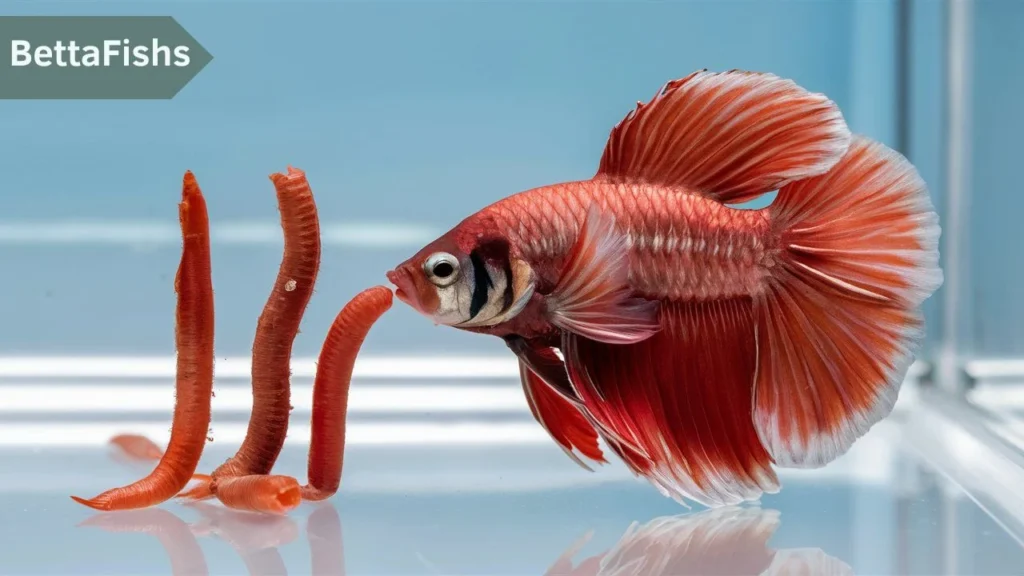
Special Considerations
Different stages of a Betta’s life require different dietary considerations. Young Betta fish, or fry, have higher protein needs, so they might benefit from more frequent bloodworm feedings. During breeding, female Betta fish may also need extra nutrition to support egg production.
If your Betta fish is sick or recovering, bloodworms can be a good way to entice them to eat. However, always consult a vet or fish expert if your Betta is unwell to ensure you’re meeting its dietary needs appropriately.
Alternative Protein Sources
While bloodworms are a great treat, they’re not the only source of protein for your Betta fish. Other options include:
Daphnia:
A tiny crustacean that’s rich in fiber and helps prevent constipation.
Brine Shrimp:
Another protein-packed option, available live or frozen.
Pellets and Flakes:
Formulated specifically for Betta fish, these often contain a balanced mix of protein and other nutrients.
Each of these options has its pros and cons, so rotating them in your Betta’s diet can keep things interesting and nutritious.
Signs of a Healthy Diet in Betta Fish
A well-fed Betta fish will display vibrant colors, active behavior, and a healthy appetite. On the flip side, signs of dietary deficiencies include dull colors, lethargy, and fin deterioration.
Bloodworms can contribute to a Betta’s overall health, but they should be part of a balanced diet. Regularly observe your Betta’s behavior and appearance to ensure they’re thriving.
Common Myths About Feeding Betta Fish
There are plenty of misconceptions about feeding Betta fish, especially regarding bloodworms. Some people believe Betta fish can eat bloodworms every day without issue, but this can lead to the problems we’ve discussed.
Another myth is that Betta fish will stop eating when they’re full. In reality, these fish can easily overeat, so it’s up to you to regulate their portions.
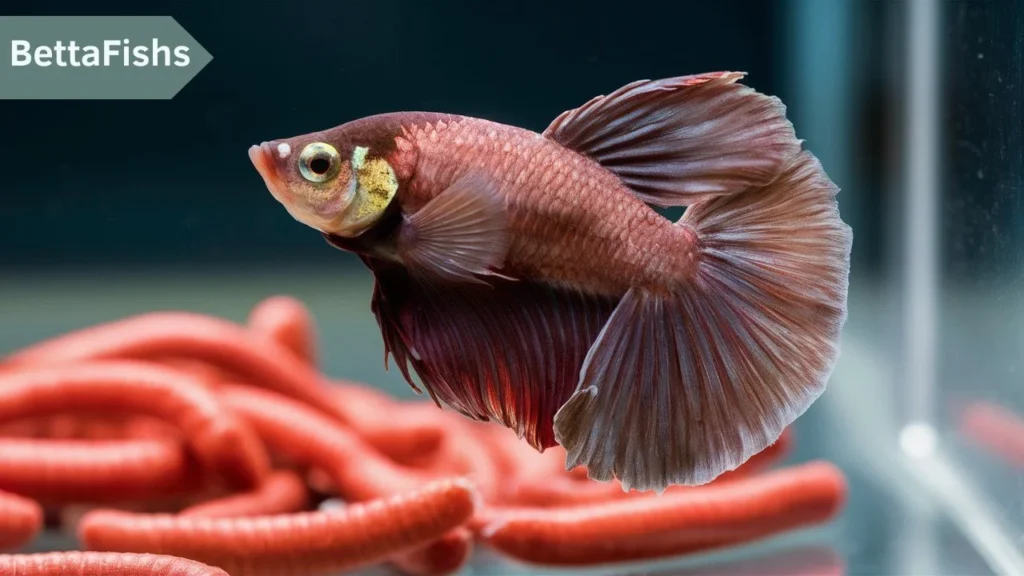
Conclusion
Feeding bloodworms to your Betta fish is a great way to add variety and nutrition to their diet, but it’s important to do so in moderation. By offering bloodworms 2-3 times a week and balancing them with other foods, you can ensure your Betta stays healthy, active, and vibrant.
FAQ
Can Betta fish eat bloodworms every day?
No, it’s best to feed bloodworms 2-3 times a week to avoid overfeeding and ensure a balanced diet.
What’s the difference between live and freeze-dried bloodworms?
Live bloodworms are fresh and more enticing but carry a risk of parasites. Freeze-dried bloodworms are convenient and safer but may be less appealing to some Betta fish.
How do I store bloodworms properly?
Frozen bloodworms should be kept in the freezer, while freeze-dried bloodworms can be stored in a cool, dry place. Always follow the storage instructions on the packaging.
What should I do if my Betta refuses to eat bloodworms?
Try offering different types of bloodworms (live, frozen, or freeze-dried) or mix them with other foods to encourage your Betta to eat.
How can I tell if my Betta fish is getting too many bloodworms?
Signs of overfeeding include bloating, lethargy, and changes in swimming behavior. Reduce the portion size or frequency if you notice these symptoms.


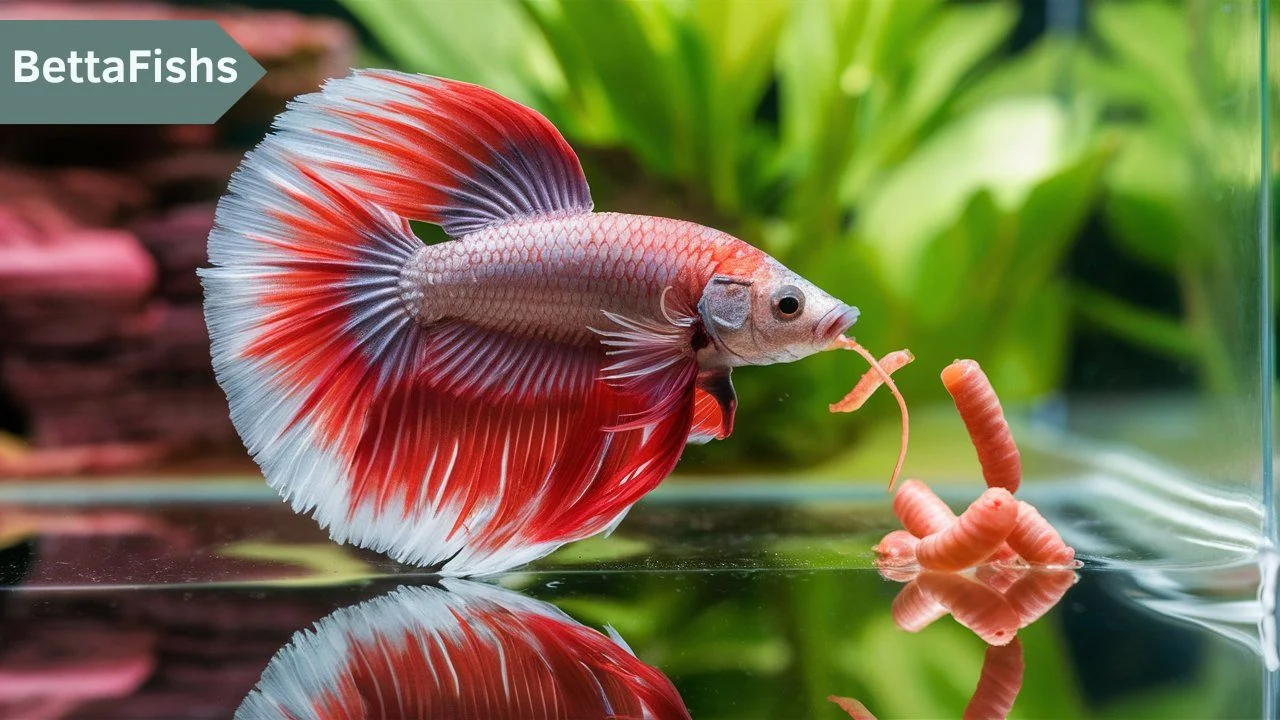
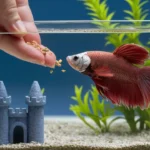

5 Comments
Leave a Reply5 Pings & Trackbacks
Pingback:How much to feed a Betta fish?
Pingback:How Often Should You Feed Betta Fish?
Pingback:how to feed betta fish while on vacation?
Pingback:How often to feed Betta fish pellets?
Pingback:How often are you supposed to feed a Betta fish?